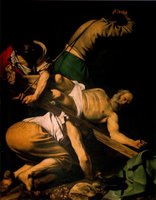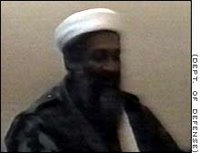
"Justice" by Raphael
Leaders within the Catholic Church have voiced their support for the abolition of the death penalty in the United States. The purpose of this discussion is not so much to disagree or cause discord but to make some important clarifications that I think are being blurred in the case being made against the death penalty by many intelligent Catholics. I believe the decision as to whether or not to apply the death penalty should be determined on a case-by-case and country-by-country basis and that the call to ban it universally has become overly generalized, not taking into account the reality that prison security varies greatly from one country to the next. To begin this discussion, it should be stressed that the Church does not see the death penalty as evil per se. The Church has made it very clear that there exist four serious threats to the culture of life; contraception, abortion, the homosexual agenda and euthanasia. Excluded from this list is capital punishment. Indeed it would be a grave inconsistency to lump capital punishment together with such acts like abortion, that are intrinsically evil. Capital punishment does not fit the bill in this regard. Nevertheless, many within the Church have begun a full-fledged campaign to bring the death penalty to an end. Why?
A movement called The Catholic Campaign to End the Use of the Death Penalty (CCEUDP) has been formed within the United States Conference of Catholic Bishops. It states, “The Catholic Campaign to End the Use of the Death Penalty is another way for the Church to say no to more violence and no to our culture of death.” Indeed, there is no paucity of statements from prominent bishops regarding their general disgust for the death penalty. Cardinal Theodore McCarrick, Archbishop of Washington has declared, “We cannot teach that killing is wrong by killing. We cannot defend life by taking life.” He added a catchy slogan, “the use of the death penalty cannot really be mended, it must be ended.” After the execution of Timothy McVeigh, one bishop’s statement read, in part, “The death penalty perpetuates a pervasive cycle of violence and further diminishes respect for life.” A brochure from the CCEUDP reads as follows, “In Catholic teaching the state has the recourse to impose the death penalty upon criminals convicted of heinous crimes if this ultimate sanction is the only available means to protect society from a grave threat to human life. However, this right should not be exercised when other ways are available to punish criminals and to protect society that are more respectful of human life.” A 2002 USA Today article took Supreme Court Justice Antonin Scalia to task for his disagreement with the Church over the issue of the death penalty. Scalia defended his position saying, "No authority that I know of denies the 2,000-year-old tradition of the church approving capital punishment.” However, many tried to pigeonhole the Justice by implying that he was morally inconsistent and hypocritical in that he opposes abortion yet supports capital punishment. But there is no trace of inconsistency in his position. For Scalia must be aware of the St. Thomas’ teaching on the death penalty, which holds that,
If a man be dangerous and infectious to the community, on account of some sin, it is praiseworthy and advantageous that he be killed in order to safeguard the common good, since 'a little leaven corrupteth the whole lump' (I Cor. 5:6) The life of certain pestiferous men is an impediment to the common good which is the concord of human society. Therefore, certain men must be removed by death from the society of men.... Therefore, the ruler of a state executes pestiferous men justly and sinlessly in order that the peace of the state may not be disrupted.... (Book III, ch. 146).
So the questions before us today are as follows: What is the distinction between the killing of an individual in cold-blood, and the state’s execution of a convicted criminal via the death penalty? Is the death penalty, carried out on a convicted criminal, an unjust act of violence perpetrated by the state? Does the death penalty “perpetuate a perverse cycle of violence,” as some bishops baldly suggest? How should the death penalty be understood and applied (if at all) in modern times? As it clearly is wrong for Catholics to support abortion, is it in a similar way, wrong for them to support the death penalty? Is there a distinction between the two acts or are both equally unjust since they involve the taking of a life?
There is clearly a distinction between abortion and capital punishment. The Church has always recognized the power of the state to execute perpetrators of violent crimes. There are probably few who would debate this. Although I have met a few Catholics who believe that the death penalty is a moral evil, on par with abortion. But the logical impotence of this assertion is evident enough that it warrants scant attention. Is there not a distinction between innocence and guilt? Abortion is a serious sin precisely because it is the direct killing of an innocent life. Are criminals convicted of heinous crimes innocent as is an unborn child? The important distinction is not very difficult to see. The controversy between the individual Catholic’s support for (or rejection of) the death penalty was settled several years ago by then Cardinal Joseph Ratzinger, who in 2004 stated,
Not all moral issues have the same moral weight as abortion and euthanasia. For example, if a Catholic were to be at odds with the Holy Father on the application of capital punishment or on the decision to wage war, he would not for that reason be considered unworthy to present himself to receive Holy Communion. While the Church exhorts civil authorities to seek peace, not war, and to exercise discretion and mercy in imposing punishment on criminals, it may still be permissible to take up arms to repel an aggressor or to have recourse to capital punishment. There may be a legitimate diversity of opinion even among Catholics about waging war and applying the death penalty, but not however with regard to abortion and euthanasia.
So do recent statements by Church leaders expressing their revulsion toward the death penalty impose any moral imperative on Catholics to oppose it? If we follow Ratzinger’s statement, we must answer emphatically, no! While we should take the bishop’s statements seriously and consider them in arriving at a well-thought out position, capital punishment is certainly a topic that is up for discussion and debate. It is unfortunate, I think, when the death penalty is judged particeps criminis in enabling and perpetuating the culture of death. For capital punishment has, from time immemorial, been understood as a legitimate tool of the state, handed on from natural law, to dispense just retribution for abominable crimes.
Traditionally, a crime involves three offenses, a crime against the individual who suffered the original brunt of the offense, a disregard for the laws of the state, and ultimately, a sin against God. Punishment subsequently serves three functions,
1. As retribution, punishing the criminal for his crime
2. As a deterrent, to ward off future crimes, alerting the community at large
3. As a corrective, to recuperate the guilty member involved
Retribution is the most essential of the three functions of punishment because the guilt of the criminal necessitates retribution. Retribution is a key component of justice. The confusion arises when retribution is confused for revenge. As Fr. Fagothey explains, “Retribution is not merely adding one evil to another, unless one were to hold that justice itself is not a good.” No one is denying that the death penalty is indeed a form of retributive punishment, so statements like those made by Cardinal McCarrick that, “We cannot teach that killing is wrong by killing. We cannot defend life by taking life,” seem to blur this important distinction by equating retributive justice with mere revenge perpetrated by the state. This is why determining guilt or innocence and punishments are handled by courts of law, to ensure that the verdict is not linked to personal vendettas or grudges, which would be rooted in revenge. Some may object, “But capital punishment denies the corrective function of punishment to the guilty party since he is killed, thus denying him opportunity to reform.” However, certain crimes are so heinous and pose such a threat to the common good and society that the corrective element is overshadowed by the other two functions of punishment, deterrence and retribution. While important, correction per se has never been seen as an essential element in punishment. But beyond that, it is not necessarily true that the guilty individual sentenced to death is denied, in the absolute senses, a chance for correction in the most important sense of his own personal conversion. For example, Timothy McVeigh, just prior to his execution, changed his mind and asked to receive last rites. Often, being faced with one’s imminent mortality forces one to reassess his life and actions.
Now we must address the application of the death penalty in modern society. The traditional argument against the death penalty states that in today’s world, prisons are secure enough to ensure that violent criminals are guaranteed to remain behind bars. The death penalty is simply no longer necessary in light of today’s advanced maximum-security prisons. Within the United States, this is a relevant contribution to the debate, but prison conditions in other countries demonstrate that this is hardly a realistic assumption to be applied across the board. In Brazil for example, prison riots and escapes over the past ten years have revealed a stark defect in that county’s ability to detain the most violent of criminals. There have been repeated cases of detainees communicating with the outside criminal world and directing crimes from within the walls of the prison. Prisoners have even been successful at digging escape tunnels. In 2001, 31 such tunnels were discovered at the Carandiru prison, after 101 prisoners had already escaped. And in 2003, 80 criminals escaped from one of Brazil’s top security prisons. Riots in various prisons have resulted in guards and police officers being taken hostage by prisoners and sometimes killed. Some prisoners manage to escape from prison altogether during such violent riots. So the question of prison security, at least in some countries, is worth investigating.
Certainly, in the United States, we don’t have such problems plaguing our prisons. For the most part, maximum-security prisons are virtually impenetrable. Therefore the US bishop’s arguments can be taken more seriously within the context of our nation’s higher quality prison system. But there is no such thing as a foolproof prison. In addition, it is impossible to foresee or predict the particular circumstances or magnitude of every future crime. So, in light of these uncertainties should we go down the road of a enacting a sweeping, permanent ban on capital punishment? Should there not remain some exceptions on the table, even in a country as advanced as the U.S.? It is also worth noting the many holes in our own justice system that often sees repeat-offenders released into society and returning to their criminal ways, sex offenders in particular. Before discussing whether or not the death penalty should be banned, we need to make sure that prison detention capabilities don’t fall victim to an enfeebled justice system.
































